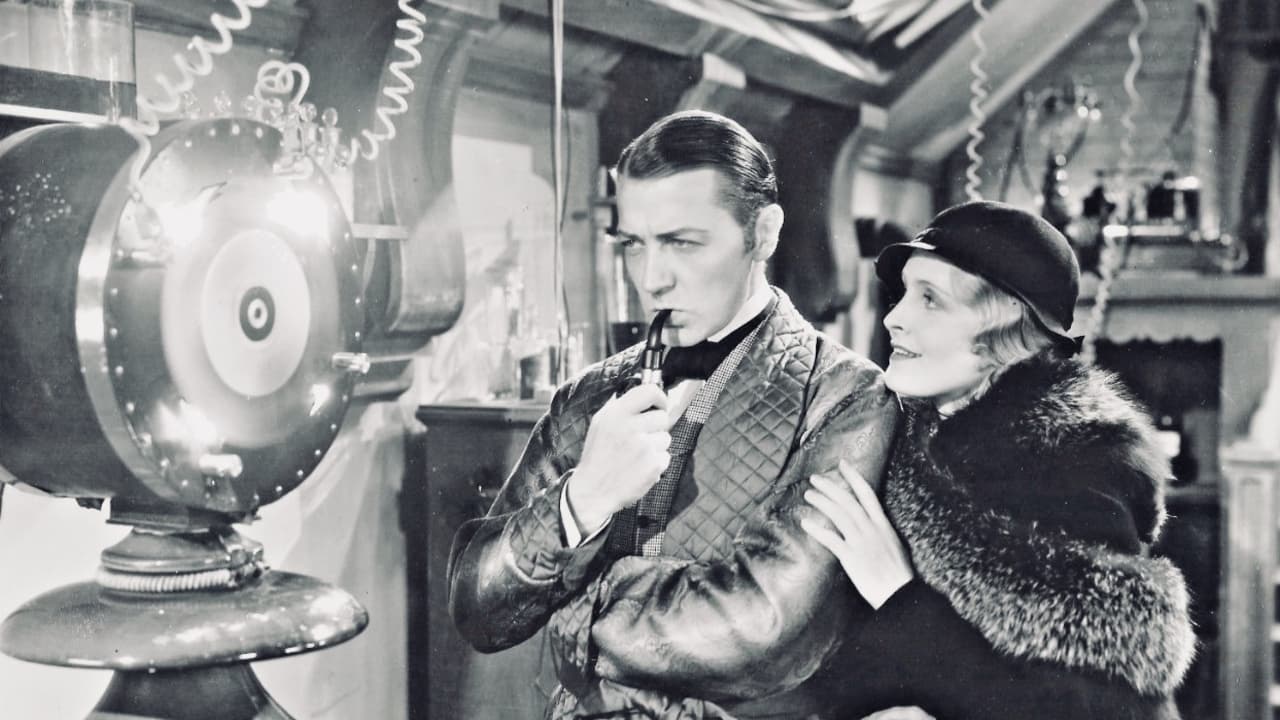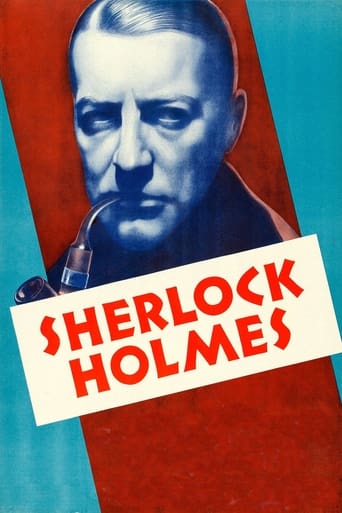

William K. Howard directed this at the top of his powers. Most sources claim he was influenced by Murnau. I think his stuff looks like Tod Browning, but it doesn't really matter where he got that fast-cutting-between-askew-images-from. It's compelling and exciting. On the other hand, the script is the least Sherlockian thing I have ever seen. It's a sequel to the Gillette play. Ernest Torrence, playing Moriarity with a gotch eye is to be hanged, so Holmes is set to retire, marry Miriam Jordan and live a life of riding to the hounds. But Moriarity escapes and begins to wreak a terrible vengeance.Clive Brooks makes an adequate Holmes, , since he lives in a world of morons. Watson disappears early on, which is a good thing, since the role is played by Reginald Owen.So, how do I rate this? It's a movie that is worth watching, because it is such a visual treat, with some wonderful ur-Noir cinematography by George Barnes, including a sequence that is mostly lit by arc welding light. However, pretend it's Bulldog Drummond and not Sherlock Holmes.
... View MoreClive Brook gets his second chance to essay the role of Baker Street's famous sleuth in a film simply entitled Sherlock Holmes. And Reginald Owen who had been Holmes in another film is very briefly seen as Doctor John Watson.That's because Watson is getting married and as such is now leaving the companionship of Holmes for one who can offer him something Holmes cannot. That's all right because Holmes himself is now keeping company with the lovely Miriam Jordan, daughter of Ivan Simpson one of London's most prominent bankers. Holmes in turn is breaking in a new assistant, the juvenile Howard Leeds.But before everyone's happily ever after ending is assured the great arch rival of Holmes, Professor Moriarty has escaped from prison and he vows vengeance on three people, Holmes, Alan Mowbray the Scotland Yard inspector who was teamed rather unwillingly with Holmes to bring Moriarty down, and the judge who sentenced him to death. It's the judge who goes first and Brook and Mowbray are in unwilling harness again.I've never seen a haughtier version of Holmes than Clive Brook in this film. But Brook really typified upper English class haughtiness and seemed always that way on screen. However Moriarty is played by the Scottish actor Ernest Torrence and he's a pretty even match for Brook in terms of intelligence and cunning the way Moriarty has come down to us. Torrence has brought in professional criminals from other countries including the USA where Chicago hit-man Stanley Fields is trying to set up a protection racket. Fields has a most interesting scene with pub owner Herbert Mundin giving him an offer he can't refuse, but does.Brook isn't quite up to either Arthur Wontner or Basil Rathbone as Holmes, but the film is all right. I fear Holmes purists will hold out for Jeremy Brett though.
... View MoreThis film, one of many to be generically titled "Sherlock Holmes," now seems to receive notice most frequently for being the earliest talkie film featuring the detective as the protagonist which is today available for viewing. This was a couple of years into the talking era, though, and there's not really any of the static awkwardness that marred many of the earliest sound movies.Instead, it's a very dark and atmospheric piece of film-making that certainly deserves recognition for this fact. William K. Howard hangs some really spooky or creepy scenes on this pastiche story of the feud between Holmes and Professor Moriarty, including haunting silhouettes headed to the gallows, tense moments waiting in darkened houses, and a great sequence in which we meet a series of gangsters at a fairground by seeing them all score perfectly at the shooting game.I like Clive Brook as Sherlock Holmes (giving an encore performance in the role; his first was, confusingly, in "The Return of Sherlock Holmes"). He doesn't inject very much emotional subtlety into the role of the detective, but he's a forceful, intense, charismatic presence in the role who demands attention. Judging from the one surviving audio recording of William Gillette, the most influential Holmes of the era, in the role, Brook seems to have absorbed some of his vocal inflections - to no ill effect.Fun to watch as the lead actor may be, Holmes is in other ways not recognizable as the iconic character we all know. Perhaps it is shame Brook was not the most introspective of Holmeses, as when we meet him at the start of the film he is engaged and seen in flirtatious exchanges with his fiancée. Strangely as this strikes us, it does generate some valid personal struggle, as Holmes must wrestle with the consequences of his promise to give up his life of chasing Moriarty as he gets married. It all leads to a scene between the future Mrs Holmes and Billy the Baker Street Irregular that is actually rather touching.Holmes is updated to the then-present day, as he was in most films in the first half of the twentieth century, so we get the amusing incongruity of the sleuth using 1930s-era slang, even if it isn't disparagingly. He also seems to be a cutting edge inventor who demonstrates his car-related discoveries with little model cars that work exactly like the big ones.In fact, I think it's almost best to think of this as a straight-up tense crime film, with a protagonist who happens to be called Sherlock Holmes. The plot too lends itself better to being a good crime movie rather than a detective picture, with no hint of a whodunnit but a nice twist near the end to increase the stakes of the chase.Reginald Owen gets little to do and does it pretty stiffly as Watson; it remains a mystery to me why he was cast as Holmes in another film the next year, unless the filmmakers wanted to cash in on nae association. Ernest Torrence, though he doesn't really look the part, turns out to be an excellently believable and threatening Professor Moriarty (even if one of his better scenes is marred by some very terrible back projection).The strength of this movie isn't its evocation of the Holmes ethos, though Clive Brook brings his magnetism to the altered Holmes. Instead it's a well-shot, tense, and sometimes macabre crime drama with a human element and a Sherlock Holmes flavor. When all is said and done, this works pretty nicely.
... View MoreIn this day and age, we have been exposed to some excellent, enthusiastic actors tackling the mighty Sherlock. In 1932, there was nothing to speak of. Sir Arthur had died a few years before, and fans knew there would be no more original stories.So, I think this is a pretty good "tour DE force." Sure, it's nowhere near any "real" Holmes story; and sure, it includes some pretty bizarre elements. But, given the times, it's worthwhile. There is some great acting, from underplaying of Holmes to really fun overplaying of the villains; a good pace to the story; and I was very happy with the production.Think B-gangster movie and you won't be disappointed. But, if you really want Sherlock, fast forward to Basil Rathbone!
... View More